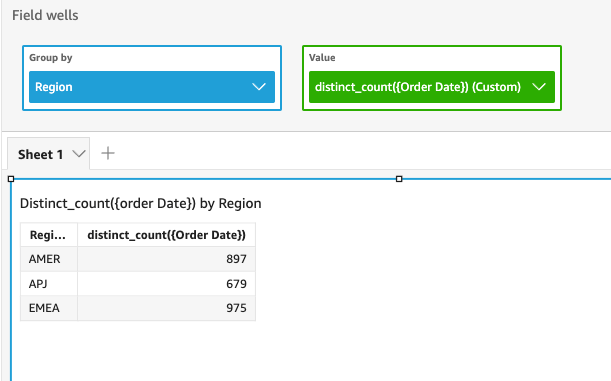distinct_count
The distinct_count function calculates the number of distinct
values in a dimension or measure, grouped by the chosen dimension or dimensions.
For example, distinct_count(product type) returns the total number
of unique product types grouped by the (optional) chosen dimension, without any
duplicates. The distinct_count(ship date) function returns the
total number of dates when products were shipped grouped by the (optional)
chosen dimension, for example region.
Syntax
distinct_count(dimension or measure, [group-by level])
Arguments
- dimension or measure
-
The argument must be a measure or a dimension. Null values are omitted from the results. Literal values don't work. The argument must be a field.
- group-by level
-
(Optional) Specifies the level to group the aggregation by. The level added can be any dimension or dimensions independent of the dimensions added to the visual.
The argument must be a dimension field. The group-by level must be enclosed in square brackets
[ ]. For more information, see LAC-A functions.
Example
The following example calculates the total number of dates when products were ordered grouped by the (optional) chosen dimension in the visual, for example region.
distinct_count({Order Date})

You can also specify at what level to group the computation using one or more dimensions in the view or in your dataset. This is called a LAC-A function. For more information about LAC-A functions, see LAC-A functions. The following example calculates the average sales at the Country level, but not across other dimensions (Region) in the visual.
distinct_count({Order Date}, [Country])
